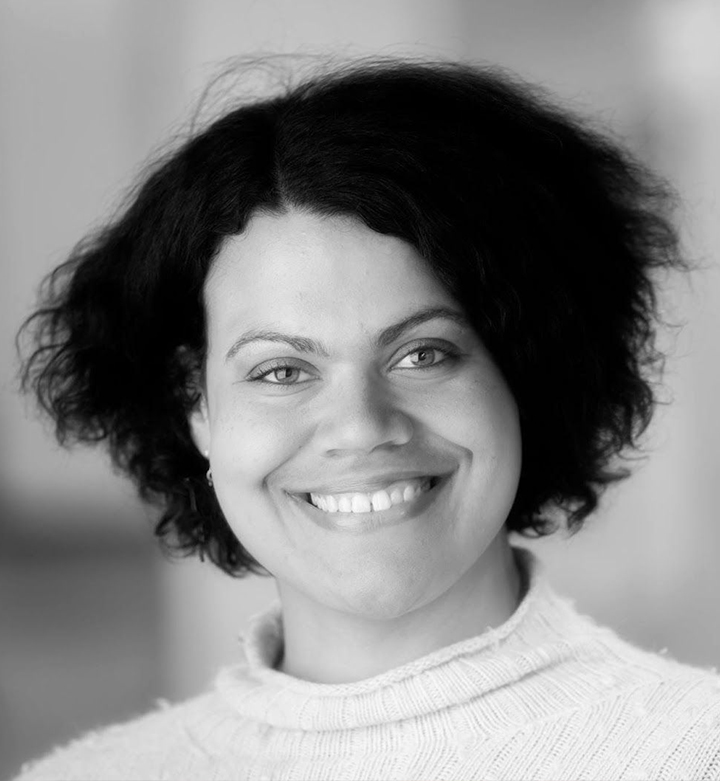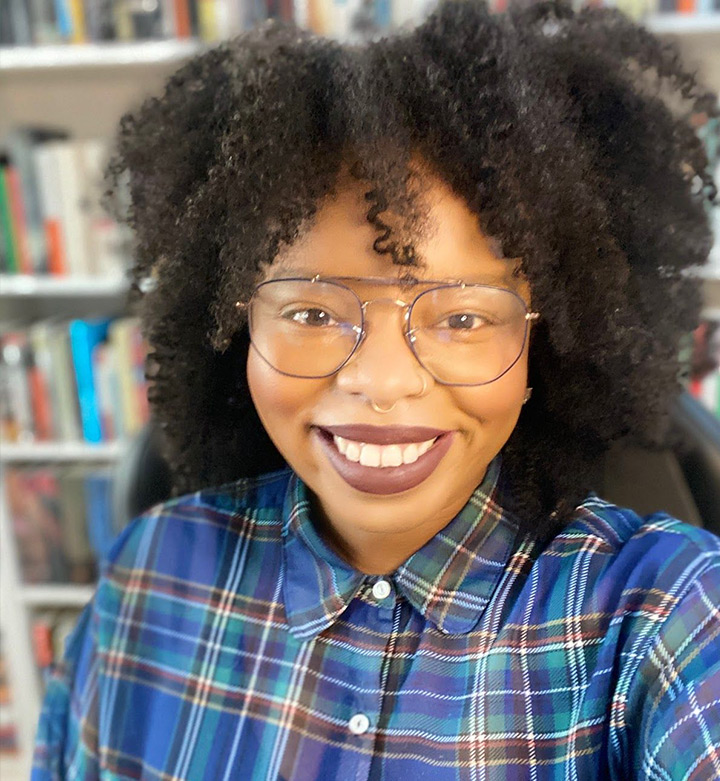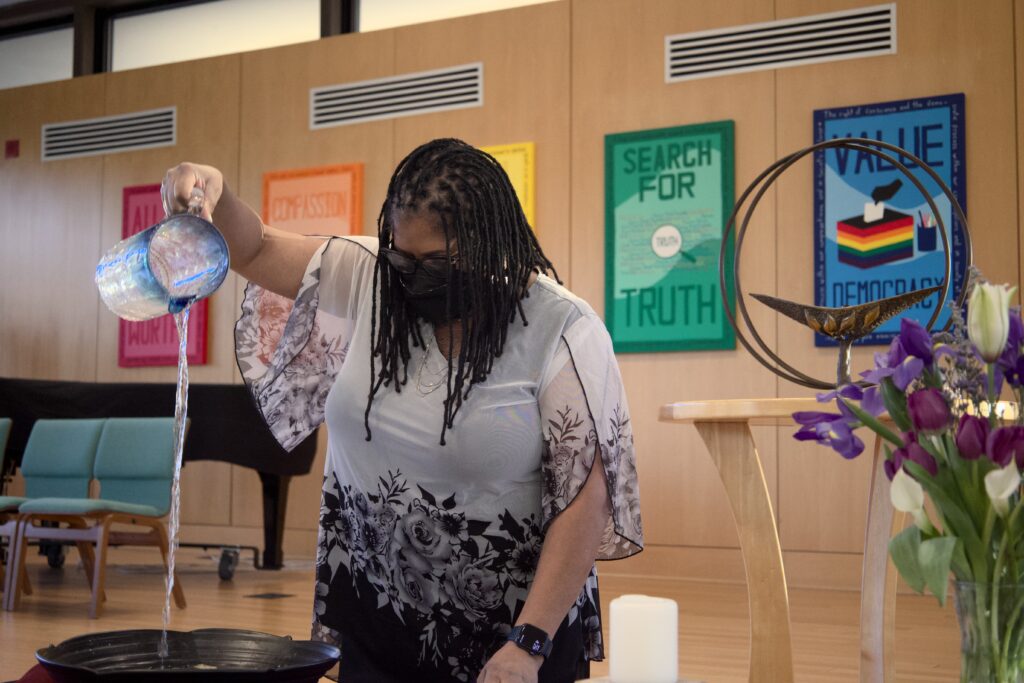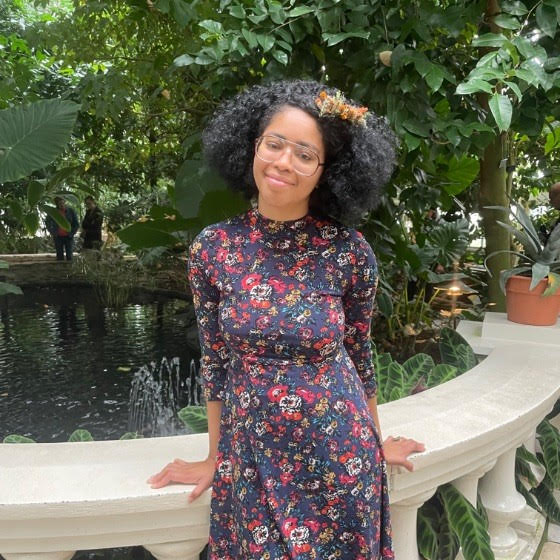BLACK LIVES OF UNITARIAN UNIVERSALISM
Organizing Collective Board
The Black Lives of Unitarian Universalism Organizing Collective Board (OCB) serves as the Board of Directors for BLUU. This is a working board whose collective work is to breathe life into the vision and mission of BLUU and be in relationships with various constituencies to build and grow a Unitarian Universalism that centers Blackness. Many OCB members are also on BLUU’s staff. Members of the OCB have various areas of expertise where they take primary responsibility for related work.
-
Overview
The Black Lives of Unitarian Universalism Organizing Collective Board serves as the Board of Directors for the BLUU organization. This is a working Board whose collective work is to breathe life into the vision and mission of BLUU and be in relationships with various constituencies to build and grow a Unitarian Universalism that centers Blackness. Many members are also on BLUU’s staff. Members of the OC Board have various areas of expertise where they take primary responsibility for related work.
These areas include (but are not limited to): organizing, communications, infrastructure, fundraising, youth and young adult ministry, content development, organizational relationship-building, worship-leading, pastoral care, and event and gathering planning.
-
Reasons for a board of directors
-
To provide oversight and long-term visioning and planning to for the organization.
-
It is legally required.
-
-
Structure
- The BLUU OCB started as a self-established group of Black organizers, that received funding from the Unitarian Universalist Association (UUA) to build out our mission and vision in the world. As part of our work to create a platform focused on self-determination for Black UUs, we created a more collaborative model of organizational leadership that centers accountability to the wider Black UU community. This model is what we called the ‘organizing collective.’
- BLUU leadership has decentralized power, instead of hierarchical power. This is a subtle but important difference. The OCB is accountable for how it uses power through shared principles, values, and a covenant (which we call working agreements), being transparent, and by being grounded in community. Because we exist in a litigious and capitalist society, in order to legally continue our work started with the generous financial investment from the UUA, we had to transition BLUU’s founding Organizing Collective into a Board of Directors (OCB). However, we are not abandoning our aspirations of collective governance and nonconventional power-sharing. We built a hybrid model to adjust to our legal requirements, while not eschewing our original commitment to collective leadership. We created three other co-governing entities, in addition to the OCB, that support the work of BLUU: the Financial Transparency Group, The Advisory Team and the BLUU Elders 360 Vision Council. Please refer to our bylaws for more information about these various groups and their relationship to the OCB and their areas of work.
- A member of the OCB can serve up to three, two-year terms.
- OC Board Members, according to our bylaws, are the decision-makers for the organization. However, the OCB is required to consult with all advisory groups in making major decisions for the BLUU.
-
Expectations
-
Attend weekly OCB meetings.
-
Attend all working retreats. Usually two per year.
-
Attend all in-person gatherings (in the past this has been a Convening, Revival, and a Symposium).
-
Agree and adhere to the OCB working agreements.
-
Engage actively in the work and help the organization grow, succeed, and develop.
-
Keep up with the fast-paced nature of project management and communications.
-
Be honest about capacity and ability to follow through with current projects.
-
Build project management skills interpersonally and in online platforms.
-
-
Working Agreements
Working Agreements
We agree to the following core agreements and protocols for movement through our work to dismantle white supremacy (and other oppressions) and to support our communities in thriving, and not just surviving. We know that leadership is a gift and a privilege. Many of us come from communities where we have endured great harm, and have harmed each other through broken agreements; BLUU strives to build a new way to liberation. We understand that violating any of these agreements or protocols could jeopardize our leadership positions within this work and, potentially, our relationships.
The BLUU OC agrees to the following core agreements:
Creating Our Space in the World
Co-creating Space
Black Lives of UU holds and creates spaces for Black UUs to thrive. That’s who we are, and what we do – virtually and physically. We also work to make UU spaces safer for Black people to enter and thrive. We are not replicating a capitalist consumer transactional model of organizing. BLUU is here in service to Black UUs, but this relationship with Black UUs is built around co-created space and leadership.
Take space, make space, share space
We are encouraged to take space when we might not ordinarily do so and to make space by choosing not to share when we otherwise share often. What happens (or doesn’t happen) in the space is impacted by the energy, intentions, and behaviors we bring into the space. We will be mindful of what we share, how we share it, our motivations for showing up in the ways we do, and how accountable we’re willing to be if issues arise as a result of our sharing.
Relationships, process, outcomes
Some organizations get overly focused on outcomes, and people get lost, or run over, or left behind. Other groups focus more on process than on getting things done. Still others build a great, kind culture, and forget to do anything with it! We strive to be mindful and work to balance cultivating healthy and safe relationships, being good to one another during the work, and working hard to achieve desired outcomes. We seek a balance between process, relationships and outcomes.
Pronouns Matter
We recognize, embrace and celebrate a diversity of gender expressions and identities. We respect people’s pronouns. We should not make assumptions about someone’s gender identity. We should give grace to elders and those who are not familiar with gender/identity politics, as they learn and grow into this movement cultural practice.
Intergenerational Relationships
As leaders of BLUU, we agree to be welcoming and open to people of all ages; and we agree to be sensitive and open to how to create spaces that feel safe, supportive and comfortable to people of all ages.
Ableism
The stories that disability metaphors tell are deeply problematic, destructive and resonant of the kinds of violence and oppression that disabled people have faced for centuries. So we agree not to use them in our communications with one another. Also, we agree to listen and respond accordingly when called in by disabled people about ableist language when used.
We also strive to move conversations beyond just “saying the right thing” in this area, but in actively and powerfully promoting action.Language matters, and disabled people face far more than ableist rhetoric as challenges.
Communication and Clarity
In our work together, we work to create an environment where we can ask clarifying questions openly, and adapt situations around needs. We agree to assume best intent from others and trust in each other as we improve on communication or seek clarity.
Growth and Identity
Openness to Growth and Transformation
We agree to be open to being transformed for the good of liberation work and for ourselves. We embrace and affirm the mandate from the regional Queer Liberation organization Southerners on New Ground (SONG), which calls us to:
Avenge the suffering of our ancestors
Earn the respect of future generations
Be transformed in the service of the work
Every day is another chance to live more deeply into this spiritual mandate. We agree to be open to being transformed in the service of the work, even when it is uncomfortable or downright painful. We will hold each other and support each other through our transformations of self and as a collective. We agree to reflecting on our strengths and challenges regularly, coming to know ourselves better, and communicating our needs to others based on this self-reflection. Evaluation in our work will stem from an honest desire to make the work better, not from a desire to passively-aggressively critique our team mates.
Honoring the complexity of identity
Each of us shows up as Black people with differing stories related to ethnicity, faith and spirituality, sexual orientation, income, gender, ability, familial status, geography, and many other things that impact not only our worldview, but also the extent to which we are able to get our basic needs met at home and out in the world. We agree to honor and acknowledge the importance of what it means to exist within the context of multiple identities.
Valuing multiplicity
We value different approaches, skills, and leadership styles, and we value that we often have different needs in our various communities. We do not believe in social, political, or religious fundamentalism–the idea that there is “only one” needed or transformative skill or approach is not reflective of who we are. We seek to work in ways that challenge and dismantle white supremacist, colonial models. For many of us, our spiritual traditions teach us that there are ‘many ways’ to find our best selves and our higher power.
We agree to honor and be present, nonjudgmentally, with people from various faiths, traditions, and spiritual paths & lenses, as well as seekers of justice and truth who may not claim a particular spiritual path.
Being flexible, dynamic and responsive & leaving room for spirit
Black Lives of UU moves. We get things done, and we respond. At our best, we are like jazz musicians, responding and paying close attention to one another, to the needs and statements of others, for the good of the whole. We move quickly–a break from UU cultural norms of caution and hesitancy.
Being in relationship
Responding to needs of local organizers, or talking with Black UUs in a congregation we come to is essential. We want first and foremost to be helpful, and that means responding differently in different situations, as opposed to just having one way. We trust those on the ground, and those who are most-directly affected in any situation.
Spiritual grounding that is nimble and strategic
We utilize our spiritual grounding to put people, our connections to each other, and our collective power over systems and established processes. We strive to be accountable to our inchoate structures, but also to be politically nimble and strategic. We want to be lovingly responsive to our world and our communities: not just our pre-made plans. The world is ever-changing, and we strive to respond quickly, grounded in our faith and in our principles.
Conflict
Moving Through Conflict Together
When there has been a breach of trust or we are feeling ill at-ease with a process or decision, we commit to bring this to the team or an individual person directly. We commit to disciplined conflict. We commit to finding the balance between showing up as our complete, honest selves in conflict–and swearing or yelling may be part of that–with recognizing that our anger or frustration may trigger others, and not be helpful. Taking a moment–breathing, gathering ourselves in, and finding constructive, powerful ways to express emotions–is something we commit to as people of faith.
We strive to express frustrations and disappointments through “action-based” critique. “You have hurt me through your actions, and here’s how,” whether spoken quietly or loudly, is far different from “you are a bad person because you’ve hurt me.” We commit to communicate through the first template, from an “action-based” perspective. We agree not to condemn each other’s character or resort to name-calling or other dehumanizing language directed at an individual or their character.
We strive to challenge a current movement norm of rampant talking behind people’s backs and indirect communication. Venting to our intimates is normal. Working in groups and then undermining them externally is a problem. We see conflict as a necessary and inevitable part of any group or collective process: conflict creates possibility for tremendous growth and/or tremendous destruction.
We agree to acknowledge and apologize for harm done, and commit to deep listening and avoiding defensiveness. If more time is needed to come to a resolution when a breach of trust has occurred, the two or more individuals involved agree to do that work together, and if support is needed from the group, we agree to support each other, as appropriate, as decided upon by the collective.
Address the problem, not the person
We will endeavor to separate the problem from the person’s humanity, trauma and personal journey to BLUU. We must address the philosophy instead of the philosopher. No one is disposable and there is always a way back to covenant – acknowledging that this way back must align with our covenanted principles and agreements, and may take time (and resources) to resolve.
Face-to-face or Voice-to-voice
It sometimes happens that people use the distance that technology provides to work through difficult situations, both because it is understandably harder to navigate conflict in-person and because we have gotten used to communicating online or over text. We agree to make every effort to communicate difficulty face-to-face or voice-to-voice, ways that enable our deepest humanity to be recognized and understood in the moment that difficulty arises. We also commit to engaging conflict in this way with one another and with the wider BLUU constituency.
Intent and Impact
We organise in high impact, low-ego ways and must acknowledge and recognise when impact falls short of goals, we do not question character or personal integrity, instead working with each other to narrow gap between intent and impact, drawing from feedback loops and agreed benchmarks to understand the impact and reasons for lesser or unintended impact.
Accountability and support
We do what we said we were going to do. If we cannot do what we said we were going to do, we take responsibility to tell other leaders while there is still time to pick up the pieces and move the project forward. We are willing, at all times, to give an account of all of our actions as leaders of BLUU and to hold our actions up to the standard of BLUU’s agreements and principles.
We also agree to provide caring feedback that supports mutual accountability and responsibility. We commit to using tools (like group evaluations and self-reflections) which we know help build more transparency and accountability. We strive to bring excellence to all parts of our work: including logistics and details. However, we do not prize details over content and relationships. We ask only that people are clear about what they can and cannot offer: we strive to not judge or critique folks’ ‘level of commitment’ or capacity. We are not machines, and we are not building ‘products’.
Honesty and Transparency
All team members agree to be transparent with their team and constituents about all matters that pertain to collective work. We believe that honesty, even when it’s hard, is at the core of building radical and loving community. We agree to creating an organizational culture where honesty is honored, even if it results in the need for BLUU to deal with difficult truths–and then realign itself accordingly.
Hope before fear
We put hope, desire, and longing at the center of our thinking and work, instead of (and before) working out of fear. This means, when in doubt, we are on the side of trusting each other (as leaders) and building trust with the other people we work with.
Patience and kindness with BLUU constituents
We commit to an organizational culture of constant leadership development and teaching. All BLUU leaders agree to be patient with people newer to this work; constantly keeping in mind that if we are still doing this work ourselves, then, at some point, someone was patient with us. We agree to do our best to be kind, and if we are feeling unable to be, to step back and/or let someone else take over our work at that moment.
This does not mean that we cannot advocate for ourselves and our own self-determination in the context of organizing, especially as oppressive scenarios arise. There is a distinction between ‘niceness’ and ‘kindness’: we can be kind *and* direct.
*How* we do this is just as important as what we do, balancing outcome, process, and relationships.
Self Care is Revolutionary
We are mindful and intentional about how we take care of ourselves and each other. When we prioritize our own needs we can show up better for each other and our community. We must also build a culture of collective care practices that reflect our self care needs and the needs of each individual. Self-care is not an excuse to neglect or disconnect.
We agree to consistently check in with ourselves about our own capacity, be willing to ask ourselves in the moment “Is this something I can really do right now?” and be willing to ask for help and/or share the load when we don’t have capacity. We agree to bring forward a deep intention to listen without the need to fix. We agree to reach out for help if a person is presenting with a situation that is more than we can handle in the moment.
Social Media/Public
We agree to not post or share anything that would compromise the integrity of the team or be in violation of these agreements and BLUU principles.
Power
Power – Not engaging in abusive power dynamics
We are seen as leaders–in Black UU and organizing spaces, and in Unitarian Universalism more broadly. That comes with responsibilities–to use our influence for good and not to harm those whom we serve. Specifically, we agree to not use our privilege around age, race, culture, language, gender, immigrant status, or ability to intentionally hurt or disadvantage other people in this work. In contrast, we agree to use our privileges whenever possible to support this work. Different BLUU Lead Team members have different identities and resources. Again, we strive to use our position for good, and we will not use our access to resources of any kind (money, information, etc.) to disadvantage or injure people with whom we work.
As leaders, we do broad-based work with a strong power analysis of oppression: looking to challenge, interrupt and transform racism, homophobia, transphobia, classism, ableism, sexism, xenophobia, and all forms of oppression whenever we can. We commit to constantly be working to figure out how to do this work. We do cross-race, cross-class, cross-gender, cross-ability, cross-immigration status work, and cross-oppression work. We understand oppression to be intersectional, and not a competition of marginalized identities. We hold ‘harnessing love’s power to combat oppression’ as a political imperative that requires us to use intersectionality as our lens, and to build leadership at the intersections of all these identities.
Engaging Conflict Together
We acknowledge that tension and disagreement are part of any community; we know that disciplined conflict and productive tension work is needed and must be strengthened and practiced in order to strengthen our collective.
Working without trademarking ideas
This is a movement, not a business. We don’t need to trademark or own every thought or idea. We will always recognize many people’s contributions and ideas. We will not be ahistorical about contributions to organizing, and will work to hold up the hard work of the many who are often invisibilized in organizing. We ask BLUU work to be acknowledged for the sake of the recognition of work of our constituencies; but we never put recognition of our work before movement-building.
We want to ensure wide access. It’s our work, and we want anyone and everyone who needs it, especially Black UUs and in some cases other UUs of color, to be able to use it and engage with it.
Stretching and self-reflection
We see constant growth and self-reflection as key components of every leader.
Honoring confidentiality
For some people in communities we work with confidentiality is a life and death issue. If we are asked for confidentiality, we will honor it. Leading organizing can provoke a feeling of intimacy from people we work with—this will often cause people to disclose personal information to us. They may come out to us as queer, undocumented, being formerly incarcerated, a survivor of sexual violence, etc. If we feel we cannot honor it under the original terms, we will go back to whoever asked us for confidentiality and try to re-negotiate the agreement. If we are not sure if a conversation was confidential or not, we will ask the person who we were in discussion with.
In this community, we may be called on to provide one-on-one care, provide rapid response individual crisis intervention, show up to be a physical presence in moments of community crisis, offer scheduled office hours for spiritual care and support, create spiritual sustenance of various kinds, and/or share reflections that have particular meaning in our lives as Black UUs. We agree to maintain the privacy of the identities and content of what is shared with the exception of mandated reporting where there is the possibility of imminent harm to self or others.
Sobriety
We commit to showing up to planning and work meetings, public presentations, and all of this work sober and free from a debilitating influence of marijuana, alcohol, or other substances. We see ourselves as part of a chain of ancestors and elders who have passed on, not knowing (but hoping) that we would do our best with what has been passed down to us. We are their legacy. We agree to do our best, bring our best, work hard, and take care of ourselves consistently. In doing this we seek to honor ourselves, our ancestors, our elders, and our peoples. We aspire to not be petty in this work, and to model integrity and commitment. We will respect the sobriety of others–not just tolerating, but embracing.
I agree to honor the above. If I cannot, I will bring it to the team, as appropriate.
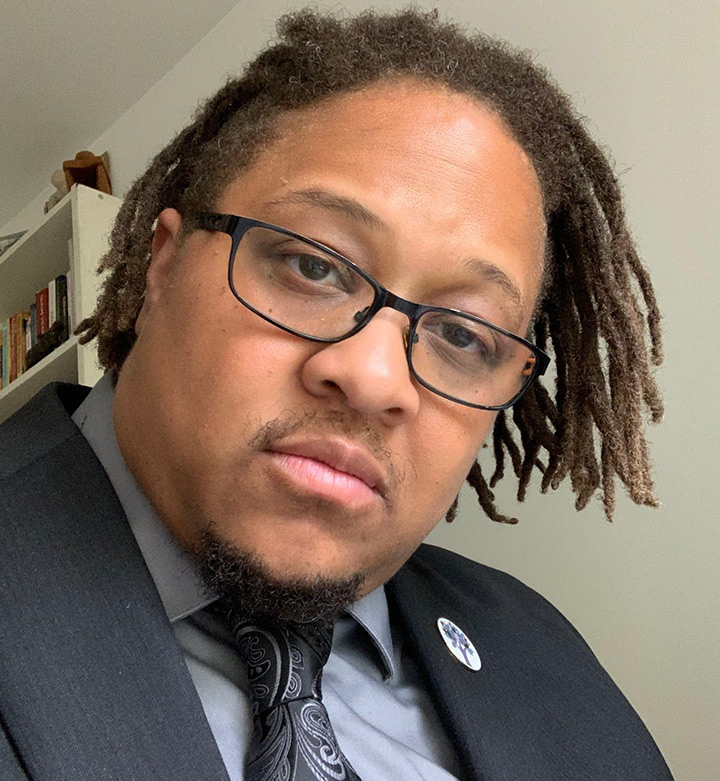
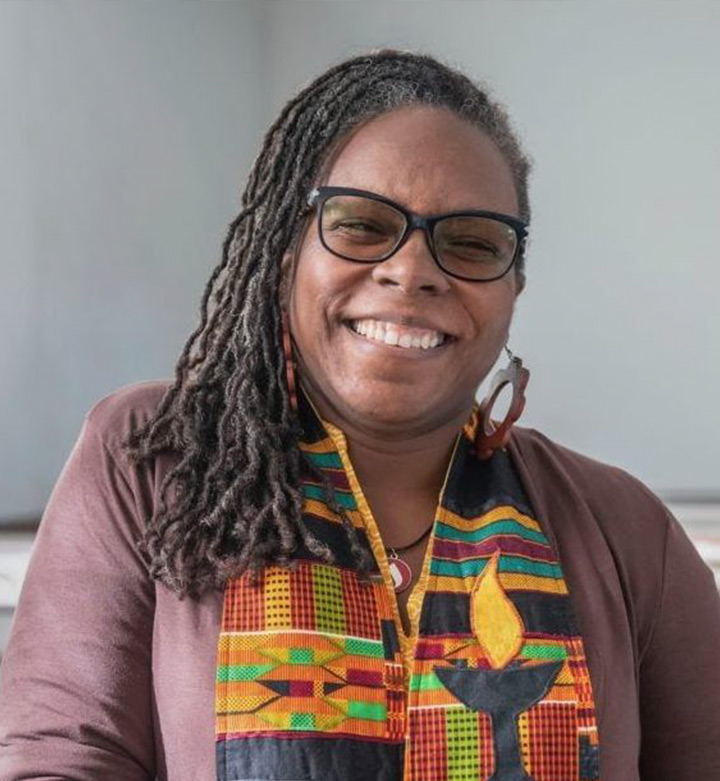
Volunteer
Opportunities
Get in Touch Today
Are you interested in using your professional and personal experience to further the mission of BLUU? If so, please get in touch to hear about future opportunities.
